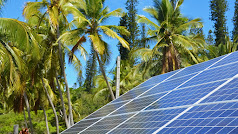Bangladesh: Towards a sustainable future through green energy and fiscal prudence
Bangladesh, a nation of extraordinary resilience, is at a critical juncture. While its economic successes are undeniable, the twin challenges of climate change and fiscal sustainability threaten to impede its progress. Embracing a sustainable future requires a paradigm shift toward clean energy sources and green technologies. The newly elected government's inaugural budget for fiscal years 2024-2025 is a good time to begin this transformation.
The possibility of switching to green energy:
Bangladesh is extremely vulnerable to climate change. Rising sea levels, erratic rainfall patterns, and intensified cycles pose serious threats to low-lying coastal areas. In addition, the country's heavy reliance on fossil fuels for energy production increases greenhouse gas emissions, further exacerbating climate risks. The transition to clean energy sources such as solar, wind and hydropower is not just an environmental imperative; this is important for long-term economic prosperity and energy security.
Fiscal sustainability and implementation of green technologies:
Achieving a sustainable energy transition requires a delicate balance between environmental goals and fiscal prudence. The government must be guided by budget constraints while ensuring sufficient investment in green technologies. The Center for Policy Dialogue (CPD), a leading think tank, has proposed a comprehensive set of fiscal and budgetary measures to promote the adoption of green energy in key sectors.
Proposed fiscal and budgetary measures:
Energy sector:
Provide tax incentives for renewable energy projects.
Introduce feed-in tariffs to encourage private sector investment in renewable energy sources.
Share the costs of research and development of clean energy technologies.
Transport sector:
Promotion of electric vehicles through tax incentives and subsidies.
Invest in public transport infrastructure, including electric buses and trains.
Encourage the use of non-motorized transport such as bicycles and rickshaws.
Agriculture:
Promote the use of solar-powered irrigation systems to reduce dependence on fossil fuels.
Encourage the adoption of climate-resilient agricultural practices.
Support and research of developments in the field of sustainable agricultural technologies.
Manufacturing sector:
Provide tax benefits to industries that implement energy-efficient technologies.
Introduce strict energy efficiency standards for industry.
Promote the use of renewable energy in industrial processes.
Funding mechanisms:
Create a Green Climate Fund to support green energy projects.
Encourage banks and financial institutions to offer financing for green products.
Promote public-private partnerships for the development of green infrastructure.
Bangladesh's transition to a sustainable future depends on its ability to use clean energy sources and green technologies. The newly elected government's inaugural budget for fiscal years 2024-2025 is an important platform to begin this transformation. By implementing the comprehensive fiscal and budgetary measures proposed by the Center for Policy Dialogue, Bangladesh can address the twin challenges of climate change and fiscal sustainability, paving the way for a greener and more prosperous future.
Literature: Center for Political Dialogue (CPD)




Comments
Post a Comment